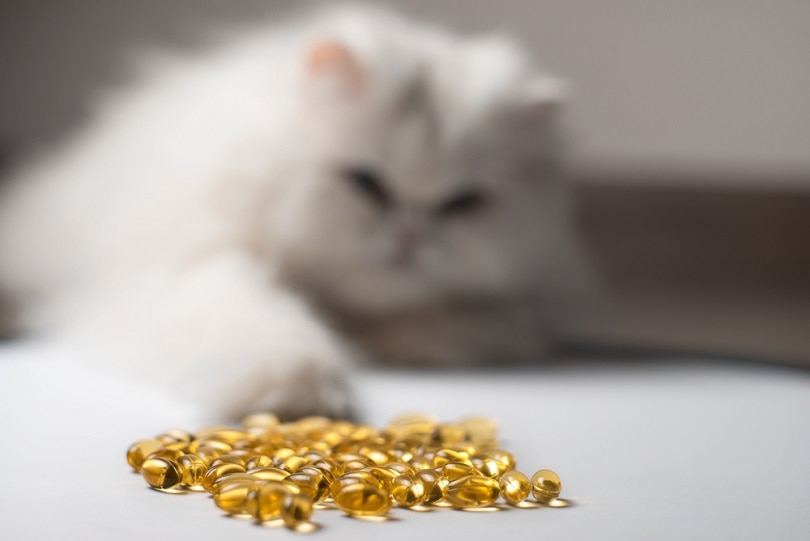Fish Oil for Cats: Benefits, Uses & Side Effects

Fish oil is a commonly recommended supplement for people. This oil is high in omega-3 fatty acids, including EPA and DHA. These are important for brain growth, skin health, and anti-inflammatory agents. While many people take this supplement, it may be useful for our cats as well. Fish oil is widely included in both cat and dog food.
On top of being used in food to increase the omega fatty acid content, fish oil can also be added as a separate supplement for cats that may particularly benefit from it. There are many supplements sold at pet stores and over the internet containing this ingredient.
However, fish oil may not be suitable for all cats – or even safe. It is not regulated by the FDA like medications since it is a supplement.
Is Fish Oil Good for Cats?
Unlike many supplements, the use of fish oil in cats has been heavily studied. There are many studies that look at all sorts of different benefits of fish oil.
One, in particular, found that both fish oil and flaxseed oil suppressed inflammation and immune response in cats. This is largely because both ingredients contain high levels of omega fatty acids, particularly omega 3s.

Another study found that fish oil and primrose were both effective at treating a specific kind of dermatitis. It is likely helpful at treating all sorts of skin disorders, as omega fatty acids are known as being important to skin health.
Other studies found that fish oil was essential for some illnesses, including kidney disease. This may be due to its anti-inflammatory behavior, which can help the kidneys function a bit better. In this study, the fish oil was given alongside a low-protein diet and other supplements. Therefore, it isn’t going to cure kidney disease, but it can be a suitable way to help control this disease.
There is some evidence that fish oil can help with cognitive dysfunction. One study was done on middle-aged male cats. The cats that took the fish oil supplement did better on most of the cognitive tests. Therefore, it is thought that fish oil provides some sort of nutrients the brain needs. Providing those nutrients helps the brain function better. Other studies have also found a protective effect on the brain.
How Effective is Fish Oil?
It depends on the cat and what results you’re looking for. Fish oil is often used in conjunction with other things, especially if it is being used specifically to treat a disease. For instance, kidney disease is often managed with the help of fish oil, but that isn’t the only thing used to treat it. Often, a protein-low diet and other supplements are used as well.
In general, fish oil seems to be quite effective for a wide variety of different things, ranging from skin irritation to cancer.

Ahoy, matey! If your cat is a true adventurer, why not let him or her sleep the way a pirate would? The Hepper Shark Cat Bed puts your cat right in the jaws of a shark, providing a cozy (and terrifying) sleeping spot.
At Pet Keen, we’ve admired Hepper for many years, and decided to take a controlling ownership interest so that we could benefit from the outstanding designs of this cool cat company!
How Can I Give My Cat Fish Oil?
There are many ways to give your cats fish oil. Fish oil is often added directly to cat food, though this isn’t true for all formulas. This is probably the easiest way to give your cat fish oil. However, you don’t always know exactly how high-quality the fish oil is if it’s just listed as “fish oil” in an ingredient list. You also often don’t know the exact dosage, which can be important for some problems.
Fish oil can also be given in the form of a capsule or liquid. Of course, capsules can be difficult to convince cats to take. Liquids can be added to water or mixed into your cat’s food. No matter the form, fish oil needs to be taken with a meal. Your cat needs fat in their digestive system to digest fish oil correctly. Otherwise, it can cause digestive discomfort, including diarrhea.
Usually, the dosage of fish oil needs to be changed until the correct dosage is found. However, improvement can take up to a few weeks to be visible.
Side Effects of Fish Oil
Fish oil is pretty safe as far as supplements go. It is hard for cats to be given too much fish oil. If they are given too much, they will be unable to digest it properly, and it will often cause digestive problems. It doesn’t cause long-term damage in most cases, though. Diarrhea and vomiting may be common.
If a cat is given too much fish oil for a long time, they may develop sleepiness, fishy odor, and overly oily skin. Delayed wound healing may also occur. This occurs with extremely long-term dosage, however.
Serious side effects sometimes occur. These include pancreatitis, which occurs when a cat consumes too much fats. Since fish oil contains fats, pancreatitis isn’t impossible.
Abnormal bleeding, persistent stomach upset, abnormal bleeding, bruising, and similar problems. Usually, these symptoms resolve after the supplement is discontinued.
Some cats may be more sensitive to these side effects. Their overall diet may play a role, as will any underlying health problems. For example, a cat is likely not going to develop pancreatitis from fish oil alone. However, if they are eating a high-fat diet in general, fish oil may be the thing that pushes their pancreas to the edge.
Other Factors to Consider
Fish oil can be tainted with heavy metals quite easily, as many fish are high in mercury and other heavy metals. Many high-quality oil companies filter these out. However, low-quality options often do not. These can cause problems for cats when used long-term, especially those that already have low-functioning kidneys.
Fish oil also shouldn’t be given to cats with blood-clotting disorders, as it can increase anti-clotting effects. Those on blood thinners should not take them either, as it can cause a little too much blood thinning. It should also be used carefully with cats prone to pancreatitis, diarrhea, and diabetes.
Conclusion
Fish oil can be effective for a variety of different problems, including skin problems, kidney disorders, and other inflammatory disorders. This supplement contains mostly omega-3 fatty acids, which are important for a host of bodily functions. For instance, the brain uses tons of fatty acids. Adding more to a cat’s diet can increase their cognitive function.
Of course, fish oil shouldn’t be used without knowing the possible side effects. Digestive discomforts are the most common, especially if the supplement is given on an empty stomach.
Related cat reads:
Featured image credit: Monfocus, Pixabay



Không có nhận xét nào